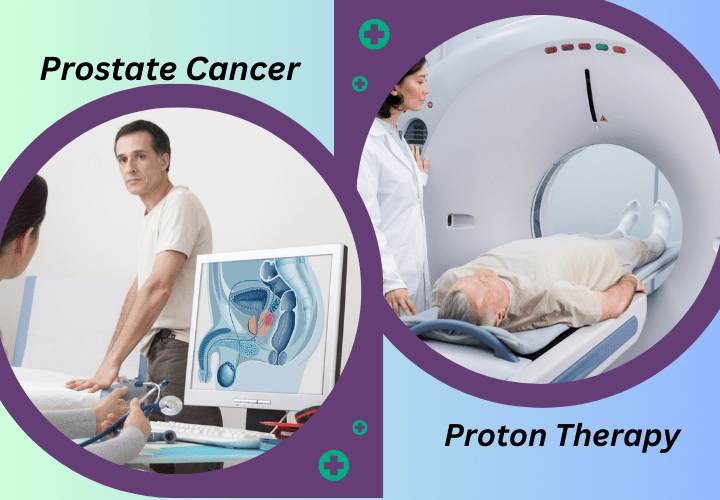The Benefits of Proton Therapy for Prostate Cancer

The Benefits of Proton Therapy for Prostate Cancer
- onco
- September 19, 2023
Thousands of new cases of prostate cancer are detected each year, making it one of the most prevalent malignancies among males. While there are many therapeutic alternatives, proton therapy is one cutting-edge and promising strategy that has drawn much attention recently. Patients with prostate cancer can benefit from proton therapy in various ways, from precise tumour targeting to fewer side effects. We will discuss the benefits of proton therapy as a prostate cancer treatment option in this blog.
Knowledge about Proton Therapy:
Proton therapy, a type of radiation therapy, utilizes positively charged particles known as protons to treat cancer. Proton treatment offers superior control over the depth and intensity of radiation delivered to the tumor compared to conventional photon radiation therapy, which utilizes X-rays. This precision becomes particularly valuable in the treatment of prostate cancer because the prostate gland, located deep within the pelvis and surrounded by vital tissues such as the bladder and rectum, benefits greatly from it.
Benefits of Proton Therapy for Prostate Cancer:
- Accurate Cancer Targeting:
One of its main advantages is the excellent targeting precision of proton treatment for prostate cancer. Protons primarily focus their energy towards the tumour before stopping, causing the least amount of harm to the surrounding healthy tissues. With this level of precision, there is a lower possibility of collateral organ damage, which means that patients will experience fewer side effects and difficulties.
- Radiation Exposure to Healthy Tissues is Reduced:
Proton treatment dramatically minimises radiation exposure to healthy tissues when compared to traditional radiation therapy. The danger of side effects such as urinary incontinence and gastrointestinal issues, which are frequent worries for radiotherapy patients with prostate cancer, is decreased due to the decrease in collateral damage.
- Improvement of Life Quality:
Maintaining a high quality of life during and after prostate cancer therapy is essential. The potential of proton treatment to protect healthy tissues translates into better patient outcomes and a higher standard of living in general. Many patients who opt for proton therapy report fewer treatment-related side effects, making it easier for them to continue with their regular daily activities.
- Compatibility with Complex Cases:
Patients with complicated prostate cancer situations should choose proton therapy. People who need further treatment after radiation therapy or surgery may find it to be especially helpful. It is an advantageous option for these people due to its accuracy and negligible effect on healthy tissues.
- Reduced Chance of Secondary Cancers:
The potential danger of getting secondary malignancies from radiation exposure is one issue with conventional radiation therapy. Proton therapy lowers this danger and gives prostate cancer patients greater assurance about their long-term health because of its capacity to prevent radiation exposure to adjacent tissues.
- Less Timely Treatment Programmes:
Proton therapy often offers shorter treatment durations than certain other radiation therapy approaches. Shorter treatment intervals might boost patient convenience and reduce the overall burden on their daily lives, albeit the precise duration may vary depending on the particular instance.
- Improved Results:
When compared to conventional radiation therapy techniques, studies have demonstrated that proton therapy can produce results for patients with prostate cancer that are equivalent to or even superior in terms of cancer control. The ability to precisely target the tumour while minimising side effects can increase the likelihood of sustained cancer remission and improve treatment outcomes.
- Very little recovery time:
Patients get a short recovery period as a result of proton therapy’s mild approach to cancer treatment. Many people can resume their normal activities soon after their treatment is over, without the requirement for protracted periods of rest or recovery.
In conclusion, men’s health is seriously affected by prostate cancer, but new treatment choices and medical technology have raised hopes. As a cutting-edge and extremely effective method of treating prostate cancer, proton therapy stands out for its many advantages, including precision tumour targeting, fewer side effects, and higher patient quality of life. Proton therapy is a useful addition to the range of therapeutic choices available to men with prostate cancer, even though it may not be appropriate in all circumstances. The best treatment strategy that is suited to each patient’s needs must be determined through consultation with a medical professional or radiation oncologist.
The involvement of proton therapy in the treatment of prostate cancer is projected to increase with the development of science and technology, allowing more patients the chance for successful outcomes and higher quality of life during and after treatment.So, discover the future of prostate cancer treatment with Oncoplus! Our cutting-edge radiation therapy for prostate cancer ensures precision and minimal side effects. Choose confidence, choose Oncoplus, as our specialized team and state-of-the-art technology make us a leader in radiation therapy for prostate cancer. Don’t compromise on your prostate cancer treatment. Trust Oncoplus for world-class radiation therapy that puts your comfort and recovery first.
Recent Posts
-
Can Testicular Cancer affect fertility?
April 23, 2025
-
Why are Breast Cancer Cases Increasing Around the World?
April 17, 2025





Leave a Reply